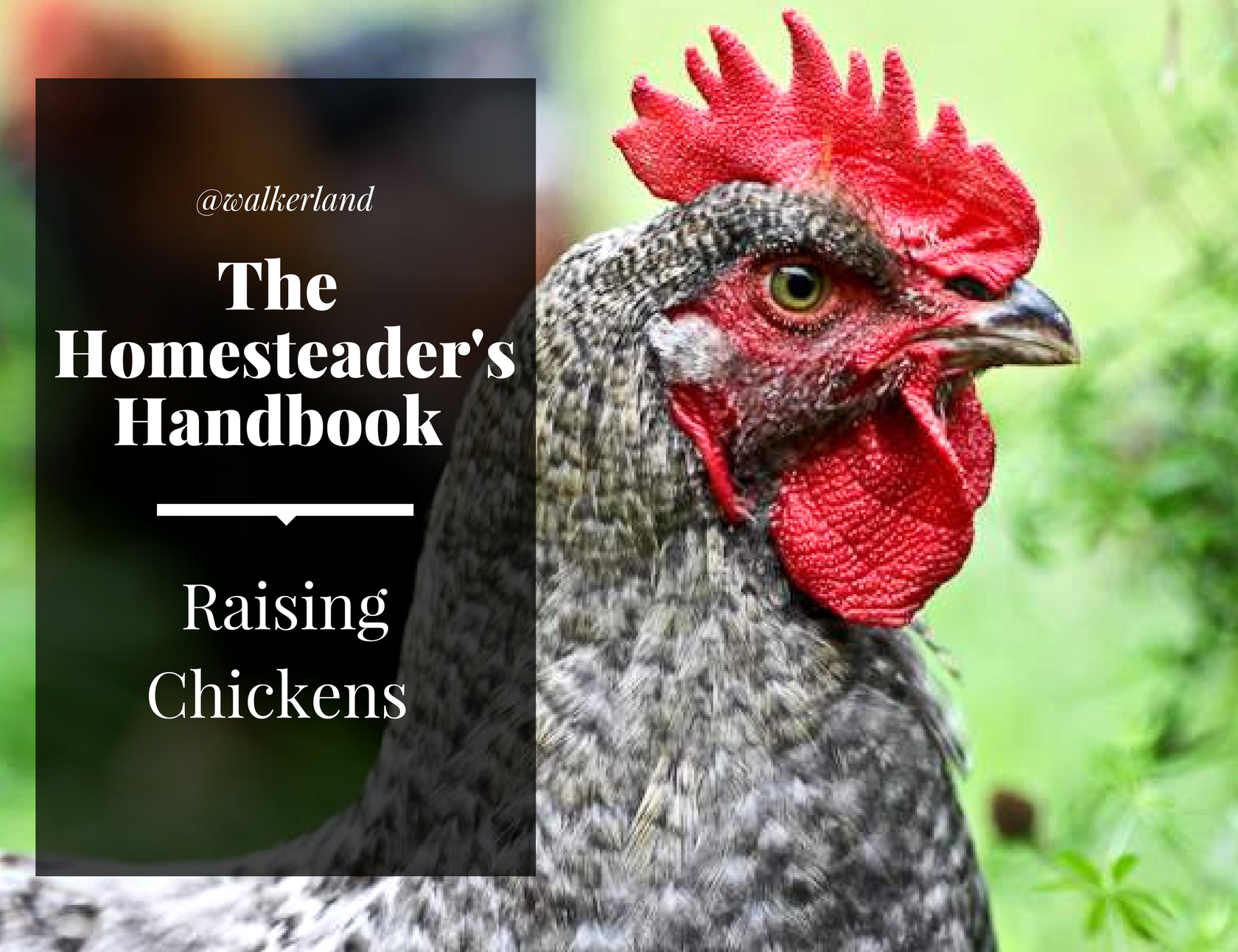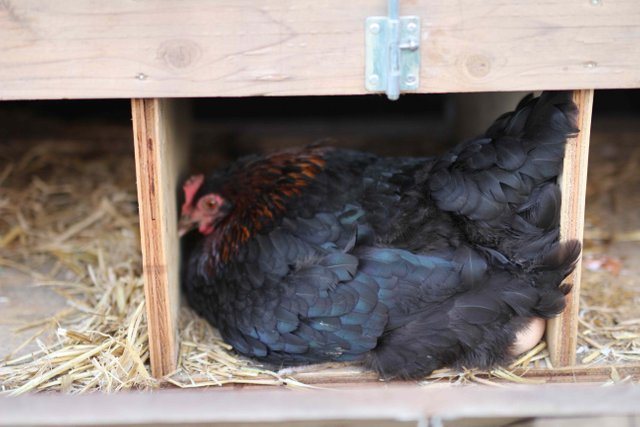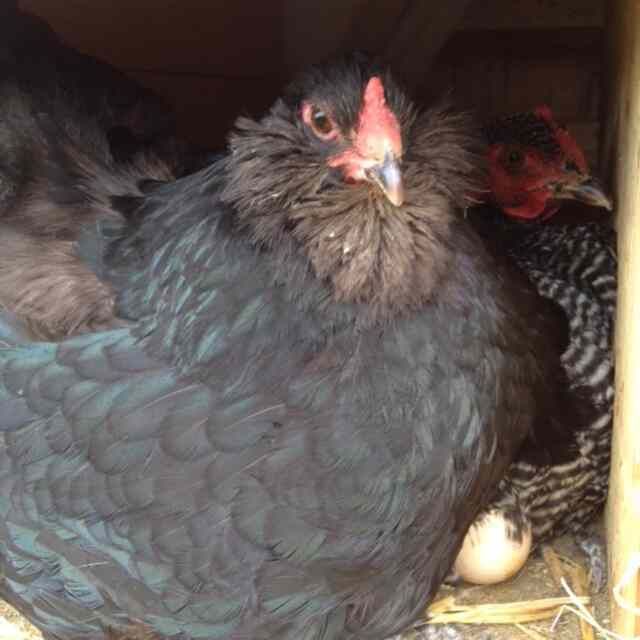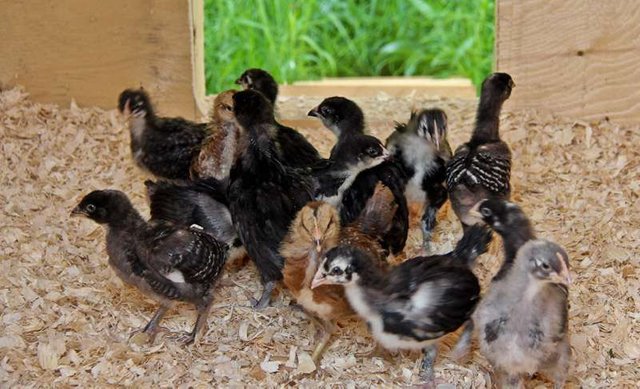The Homesteaders Handbook: Raising Chickens Part 7
.jpg)
This is the seventh part in a complete series on raising chickens! In this chapter we'll talk about broody hens and hatching chicks naturally and using an incubator.
You can find earlier chapters here:
The Homesteaders Handbook: Raising Chickens Part 2 - Breeds, hybrid vs heritage and more
The Homesteaders Handbook: Raising Chickens Part 5 - Baby chicks
The Homesteaders Handbook: Raising Chickens Part 6 - Hens
Broodiness
A broody hen is one that feels she is ready to be a mother. Often times you may find a broody hen sitting in one of the nesting boxes for most of the day. She may come out once to do her business and then back in she goes. A good way to confirm that this is what is going on is to check at night. A broody hen will remain in the nesting box rather than joining the rest of the flock on their perch.
 A broody hen will stubbornly cling to her chosen nesting spot.
A broody hen will stubbornly cling to her chosen nesting spot.
Breaking Broodiness
If you don't have a rooster then you will want to break your hen of her broodiness. She will stop laying eggs and will lose weight so it's best to try to help her. First of all, you will want to move her to a private location away from the other hens.
You can try slipping ice cubes under her belly to help cool her down, this can take quite a long time to take effect. An easier option is to put her in a cage with a wire bottom. You can blow a fan on her underside which will quickly cool her down. Provide her with food and water and treats and keep her away from the coop until she is no longer appears to be broody.
If you let her out too early she will simply return to the nesting box to try again. If that happens, rinse and repeat.
Natural Hatching
If you have a rooster and some fertile eggs then you can use your broody hen to hatch them. It's fairly easy to identify a broody hen. She will go off on her own and stay put for hours on end, typically in a nesting box where there are eggs for her to sit on.
If you decide you want her to hatch some chicks you will want to move her a safe and comfortable location to do her job. You want to set her up with a quiet and relaxing place away from the other hens. The nesting box is a particularly bad place because other hens will jump in when she is absent to lay their own eggs, interfering with the nest.

This is a photo of THREE hens fighting over one box. We have multiple boxes all identical but they wanted to kick the broody hen out.
Create A Designated Area
A wooden crate turned sideways or an old dog kennel is really useful. She will need access to additional space outside of the nest to do her business and take a break, eat and drink. This will also serve as a nursery when the chicks arrive so you want it to be safe and secure.
It takes about three weeks for chicks to hatch under a mother hen. You should avoid interfering with the process. She will turn the eggs, and keep them warm. If you notice eggs that get rolled away from her, you can check them under a lamp but most often she has rolled them out because they are not viable and are going bad.
Limit Your Involvement
You should check the nest when the hen is eating, make sure the bedding is clean and that there are no broken eggs. Some people will candle the eggs after the first week so that they can remove infertile eggs. If you must do this, it should be done with extreme care and you should limit your handling of the eggs to just once.
If she does not have enough eggs under her when she begins the nesting process, you can slip more into the nest. Average sized hens can sit on up to a dozen eggs.
Weight Loss & Health
Broody hens tend to lose a lot of weight. They won't leave the nest unless they have to. This means two things. 1. Sticking some snacks in with her and making sure she is leaving the nest to eat and drink a few times per day 2. When she does poop, it is an enormous mound. Rather gross actually. Don't be alarmed.
When the chicks hatch, the hen should care of them. Not all hens are good mothers though so be very watchful. Make sure there is chick starter feed and plenty of water. A good mother will teach them all they need to know so you don't really need to interfere.
Introducing to the flock
You will want to keep the mother hen and chicks separated by a barrier from the rest of the flock for a few weeks as the chicks learn and get stronger. A lot of people will then move the nest into the coop so the mother can be with the chicks at night while giving the flock a chance to adjust to the new birds. The mother will guard and defend the chicks quite fiercely until they are able to take care of themselves.
Be watchful!
Thing do go wrong sometimes. Some hens are bad mothers and try to kill the chicks. Some hens will get tired of being broody mid process. This is not something you have done wrong, it just happens sometimes.
Allowing a hen to become a mother is quite a wonderful thing for her and for you to witness. The beauty of allowing the natural process to take place is that the flock tends to accept the chicks more readily and the mother is there to protect them. When you hatch via an incubator they do not have this same protection making the process far more challenging.
Incubators
Incubators are an alternative to naturally hatching. If you are planning to hatch for commercial purposes and simply need a lot of chicks, or if your hens just aren't going broody for you this is a good option. Some incubators do more than others so shop wisely. If you aren't available to turn the eggs at designated times or to monitor the humidity you will want to buy a more advanced model that will take care of these sensitive tasks for you. Maintaining the correct temperature and humidity are extremely important.
Introducing chicks to the flock
Introducing chicks that have been hatched in an incubator to your flock can be challenging. Also, there is no mother hen to teach them how to drink, eat and to keep them perfectly warm. You will have to teach them yourself and monitor them to make sure they are warm, but not too warm and that there are no issues. The chapter on Baby Chicks covers this in greater detail.
The largest problem with hatching chicks using an incubator is that they don't have the protection of a flock member. A mother hen will fiercely protect her chicks and this makes integration with the new flock far easier. This is not to say that things don't go wrong when allowing a hen to hatch chicks, they most certainly do go wrong. It is one of those realities that you become accustomed to as you become more experience with raising chickens. What it does mean though is that integrating them into the flock is solely your responsibility and it's going to take time, patience and a watchful eye.

This content comes from my Ebook "The Homesteader's Handbook: Raising Chickens". It's available on Amazon here. I've decided to give the knowledge away here on steemit where it may help those looking to get into raising chickens. This was always my intention when writing this book.
All rights reserved. Photos copyright @walkerland The information in this book is true and complete to the best of our knowledge. All recommendations are made without guarantee. The author and publisher disclaim any liability in connection with the use of this knowledge.
Building a greener, more beautiful world one seed at a time.
Homesteading | Gardening | Frugal Living | Preserving Food| From Scratch Cooking|
You can also find me at: walkerland.ca
Photo copyright: @walkerland

Oh wow, thanks, @walkerland, have now managed to read through the rest of the series and there is so much useful info in there. Thanks a lot for taking the time to write this and for sharing it openly on this platform. It sure makes a difference to homesteading noobs like me. If I manage to stick around I will surely post about our chickens and will definitely mention you advice.
I am sad however that I cannot upvote the older posts for you to get a reward. This is the biggest downside with Steemit. Incredibly useful content that remains relevant cannot continue to provide the creator with the appropriate author reward... Damn I wish they could come up with an alternative way to solve this!
I agree wholeheartedly. Being unable to vote or resteem older posts is definitely Steemit's biggest downside. Ive found some awesome posts, full of good info that I can no longer voye for (hopefully someone is thinkibg the same about my older posts too...).
Glad you liked the content. There will be 3-4 more posts to go after this one. Roosters are next. I look forward to reading about your own experiences with chickens!
It would be great if we could up vote work we enjoy regardless of the posts age but heck, even as it is - steemit is far better than Facebook or any other platform. If I were you I would stick around! :)
I am glad I found this post, I will read the full raising chicken series as well. I am a newbie to steemit, and when I find useful, enjoyable content like this, It reinforces my support for the platform. More importantly, I get inspired to try new things and learn from others like yourself. Thank you, I look forward to seeing more from you in my feed.
This is really interesting. Having not had a rooster we always broke broody with the wire cage. Someday, when I have a much larger area, I'd like to let a hen raise chicks. When I was a child our bantams raised lots of chicks for us.
Oh my God. How nice what your post. I like it.
Oh, hang on, I am going to have to start the series from the beginning! Chickens is the first thing we are wanting to get for our 'small holding'... and it sounds like your guide is comprehensive and easy to read... Will be back.
This is great information! Ill be sure to read all the earlier posts that you've listed.